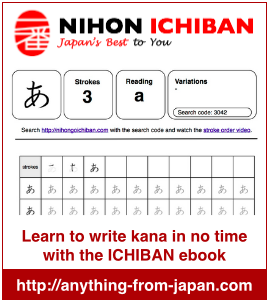This is the table of all i-adjectives you need to know for the Japanese Language Proficiency Test (JLPT) N4. Click on the adjective and all the grammar forms of this adjective.
| Kanji | Furigana | Romaji | Meaning |
| 青い | あおい | aoi | blue |
| 赤い | あかい | akai | red |
| 明るい | あかるい | akarui | light, bright |
| 温かい | あたたかい | atatakai | warm |
| 新しい | あたらしい | atarashii | new |
| 暑い | あつい | atsui | hot (air) |
| 厚い | あつい | atsui | thick |
| 危ない | あぶない | abunai | dangerous |
| 甘い | あまい | amai | sweet |
| 良い | よい / いい | you / ii | good |
| 忙しい | いそがしい | isogashii | to be busy |
| 痛い | いたい | itai | to be painful |
| 薄い | うすい | usui | thin |
| 美味しい | おいしい | oishii | tasty, delicious |
| 大きい | おおきい | ookii | big |
| 遅い | おそい | osoi | late, slow |
| 重い | おもい | omoi | heavy |
| 面白い | おもしろい | omoshiroi | intersting, funny |
| 辛い | からい | karai | hot, spicy |
| 軽い | かるい | karui | light (not heavy) |
| 可愛い | かわいい | kawaii | cute, pretty |
| 厳しい | きびしい | kibishii | strict |
| 黄色い | きいろい | kiiroi | yellow |
| 汚い | きたない | kitanai | dirty |
| 暗い | くらい | kurai | dark |
| 黒い | くろい | kuroi | black |
| 細かい | こまかい | komakai | small, fin |
| 怖い | こわい | kowai | Frightening |
| 寂しい | さびしい | sabishii | lonely |
| 寒い | さむい | samui | cold |
| 白い | しろい | shiroi | white |
| 涼しい | すずしい | suzushii | cool |
| 凄い | すごい | sugoi | terrific |
| 素晴らしい | すばらしい | subarashii | wonderful |
| 狭い | せまい | semai | narrow |
| 正しい | ただしい | tadashii | correct |
| 高い | たかい | takai | high, expensive |
| 楽しい | たのしい | tanoshii | pleasant, enjoyable |
| 小さい | ちいさい | chiisai | small |
| 近い | ちかい | chikai | near, close |
| 詰らない | つまらない | tsumaranai | uninteresting |
| 冷たい | つめたい | tsumetai | cold |
| 強い | つよい | tsuyoi | strong |
| 遠い | とおい | tooi | far |
| 長い | ながい | nagai | long |
| 苦い | にがい | nigai | bitter |
| 眠い | ねむい | nemui | to be sleepy |
| 早い | はやい | hayai | early |
| 速い | はやい | hayai | fast, quick |
| 恥ずかしい | はずかしい | hazukashii | to be embarrassed |
| 低い | ひくい | hikui | low |
| 広い | ひろい | hiroi | wide, spacious |
| 酷い | ひどい | hidoi | awful |
| 太い | ふとい | futoi | thick, fat |
| 古い | ふるい | furui | old |
| 深い | ふかい | fukai | deep |
| 欲しい | ほしい | hoshii | to want something |
| 細い | ほそい | hosoi | thin, fine |
| 不味い | まずい | mazui | bad tasting |
| 丸い | まるい | marui | round |
| 短い | みじかい | mijikai | short |
| 難しい | むずかしい | muzukashii | difficult |
| 珍しい | めずらしい | mezurashii | rare |
| 優しい | やさしい | yasashii | gentle |
| 安い | やすい | yasui | cheap |
| 柔らかい | やわらかい | yawarakai | tender, soft |
| 宜しい | よろしい | yoroshii | ok, all right (respectful) |
| 若い | わかい | wakai | young |
Learn more about i-adjectives:
Related articles:


